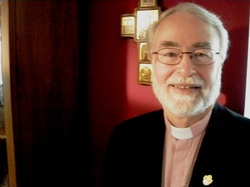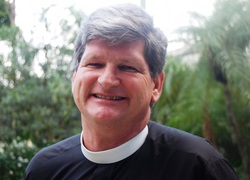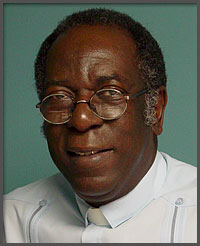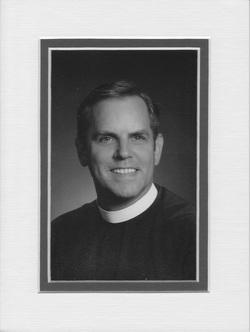 March 18, 2013 or Day 71 – Deuteronomy 19-21, Psalm 59, Luke 17
Dealing with the realities of war are always challenging, but especially in a war of conquest. What is to happen to those who are being dispossessed? As hard as these decisions are for us in the moment, they are more startling to read captured forever in Holy Scripture.
The interesting difference in concern regarding a person who accidently kills another versus the complete destruction of the people whose cities are given over by God concerns me. Innocent blood is a designation not given to those in cities that have been chosen for the invading armies. These are clearly written before the Geneva Convention!
I have an even stronger reaction to the idea that women from the conquered people can be taken as a wife. She, you will notice, is not consulted. I don't know how this sounded to the people of the day, to my modern ears I hear the echoes of a culture of rape that doesn't acknowledge the personhood of women.
These readings trouble me. They make me wonder how God, the God who in the person of Jesus would heal foreign born people of leprosy would have such little regard for them in war. How could the Lord, who led others to freedom would so easily condemn the cities who surrendered to forced labor?
Reading the scripture is troubling and this is one of the reasons why some have thought it better not to allow the faithful to read it on their own. However, it is only as we struggle through it all - the uplifting and the troubling - that we can really come to see the full picture of what we call the Bible has to offer. This library shows us the full scope of our walk and struggle with God.
The Rev. Cori Olson
Priest-in-Charge, St. Luke the Physician, Miami
 Meditating for March 16, Luke 16
Bryan Hobbs
Lazarus & the Rich Man
This is one of the few stories in the Bible that gives us a glimpse into the realities that await us after death! This is, of course a parable, so we have to go lightly in using the details from a parable to describe the realities of heaven but what Jesus presents is sufficient to give us a picture of what awaits us.
Luke's Lazarus should not be confused with the Lazarus Jesus raised from dead in the Gospel of John. They are obviously vastly different characters. Luke's Lazarus was rich beyond anyone's wildest imagination. He had lavish wealth and lived a lifestyle suitable to his wealth, wealth that was understood in the readers mind to be a gift from God for righteous living! Obviously, what the reader thought was the gift of righteousness was not exactly what God considered righteousness...a phenomena that is too often found within even the deep recesses of our own lives.
Lazarus' story is an opportunity for all of us to take pause and examine our own hearts. Lazarus' primary issue was not only his blindness to the suffering realities around him but his unwillingness to share even the smallest portion of his abundance.
This reality hit my heart squarely last week (March 1) during my visit to San Diego while attending a conference. Before the conference, I was walking along the beautiful waterfront that bordered San Diego Bay. I was just relaxing and praying and absorbing and being absorbed by God's beauty! Everything was gorgeously beautiful and the weather was exquisite...I mean perfect! Beautiful waterfront setting with manicured parks, restaurants & yacht basins with tall, ornate hotels, office buildings and a grand convention center filled my senses!
Nonetheless, In the midst of all this opulence, what struck me was the number of homeless men & women who seemed so out of place in contrast to the wealth that was around us. My mind and heart just couldn't grasp that people had no home while surrounded by such wealth. It even startled me that I was startled!
I am certainly acquainted with the myriad of reasons why people live on the streets. Being a priest means befriending the homeless and I have many, many friends over the years whose home was the streets of Key West and Pembroke Pines. A relative of mine lived in the streets on and off for much of her adult life. She stayed with us on numerous occasions although most of the stays were brief from her own choosing. This is the case for many of those who reside on the street. But San Diego seemed to be different. I wondered if my heart had grown cold over the years. Had I gradually become numb to the life- long struggles experienced by those who live long periods of their lives on our streets? Over time, had I become more and more like Lazarus? Had more and more of the invisible and voiceless entered into the blind recesses of my heart and soul? Oh my.......that is a most uncomfortable experience!
Well, I did help a few and the rest I prayed for and wondered who they were and why had God so impressed them upon my heart. Why was it that so many jogged on by with electronics blaring sweet music in their ears while something even sweeter was right before them? I wondered how I could help! I prayed and continued to pray.
 The Bible Challenge
Day 67 Reflection
Deuteronomy 10-12, Psalm 56, Luke 14
The Rev. Mark Andrew Jones, BSG
“So now, … what does the Lord your God require of you? Only to fear the Lord your God, to walk in all his ways, to love him, to serve the Lord your God with all your heart and with all your soul, and to keep the commandments of the Lord your God and his decrees … for your own well-being” (Deuteronomy 10:12-13).
It’s about love and relationship! And the commandments, far from being this collective instrument by which we measure worthiness and induce shame, the keeping of the commandments is for our own well-being. And when others “trample” and “foes oppress me” all day long, I put my trust in God, “whose word I praise” (Psalm 56:4). No, I will not exalt myself, especially at the cost of another.
In the end, we will be blessed to eat bread in the kingdom of God.
 Day 66 March 13, 2013
Deuteronomy 7-9, Psalm 55, Luke 13
What are you hearing? Sh'ma Yisrael Hear, O
Israel
In Deuteronomy, we have heard this invocation again and again from Moses, listen up people!
What you might hear in Deuteronomy and Luke in today’s readings, the start of two juxtaposed doctrines. In Deuteronomy we have the beginnings of a
‘doctrine of election’ – in verse 7:6 Moses is speaking to the people of Israel: “For you are a people holy to the Lord your God; the Lord your God has chosen you out of all the people on earth to be his people, his treasured possession.” Moses has recommended – in quite a commanding tone – that the people are to rise up and defeat seven mightier nations and “make no covenant with them and show them no mercy.” The people in Deuteronomy are feeling pretty mighty and special at this point. In Deuteronomy’s stories about these chosen folks, one could begin to understand that God has an ‘in’ group and an ‘out’ group.
We might hear that same position in the beginning of Luke we hear a ‘repent
or perish’ kind of doctrine – those who repent are looked at as part of the
chosen. But Luke goes on later in Chapter 13 to a ‘doctrine of
inclusivity’ which emerges in Luke 13: 29 and 30. Then people will come
from east and west, from north and south, and will eat in the kingdom of
God. Indeed some are last who will be first and some are first who
will be last.
Luke 13:1-9 will sound familiar if you were able to be in church a week ago
on Sunday – the third Sunday of Lent. If your preacher chose to preach on
this gospel passage from Luke (rather than the old testament or epistle also
appointed for that day,) you likely just heard a sermon on this! What did
you think? For many preachers 3 Lent was a wonderful opportunity to preach
on Exodus 3:1-15 – Moses at the burning bush – which we read way back on Day
20. Moses’s story is a much more exciting story of call and possibility
compared to the repent or perish message of Luke 13.
The Very Rev. Kathleen Gannon, Curate
St. Paul's Episcopal Church, Delray Beach, FL
 The Diocese of Southeast Florida Bible Challenge
Day 65 – Deuteronomy 4-6, Psalm 54, Luke 12
The Fifth Book of the Torah, Deuteronomy is purported to be a “farewell address” by Moses to the people Israel before they enter the Promised Land, leaving him behind to watch from Mount Nebo. Contemporary scholarship, however, recognizes that the book of Deuteronomy was written well after the time of Moses, probably as late as the 7th century B.C.E. with composition extending into the Second Temple period, that is, after 530 B.C.E..
The name “Deuteronomy” literally means “second law” and is derived from a misunderstanding of 17:18 which uses the phrase “a copy of this law” (See Bultmann, Christopher Introduction to Deuteronomy in The Oxford Bible Commentary, Oxford: Oxford University Press, 2001, p. 135). The Greek translation of The Hebrew Bible, the Septuagint, uses the term “deuteronomion” to translate this term, hence the title of the book. In Hebrew, the book is called DEBARIM, the Hebrew word for “words” as in “These are the words that Moses spoke.” DEBARIM is the first word in the Hebrew version of this book.
It has long been recognized that some early form of Deuteronomy was closely related to the book “discovered” during the time of Josiah’s reform (see 2 Kings 22:1 – 23:25 and the “Introduction” to Deuteronomy in The Oxford Annotated Bible with Apocrypha – NRSV, 3rd Edition Oxford: Oxford University Press, 2001). This “discovery” led Josiah and the people to acknowledge their sin, to return to God and to commit themselves to a more stringent adherence to Yahweh’s Law. As the Introduction to Deuteronomy in The Oxford Annotated Bible notes, “Moses, as Deuteronomy’s speaker, arrests the narrative’s action in order to deliver a series of three speeches…He reviews the nation’s history, expounds upon their law, and instructs them about the importance of loyalty to God.” Chapters 4 – 6 of Deuteronomy certainly contain these elements.
Chapter 4 is framed as an address by Moses to the people. It is an exhortation to obey the Torah, but also a theological reflection on the importance of steadfast loyalty and obedience to God and on the consequences of disobedience. Although the narrative is set in the time of Moses (ca. 1200 B.C.E.), it is more likely that this section of Deuteronomy was written during or after the Babylonian Exile of 587 B.C.E. since 4:25 – 27 seems to be making clear reference to that exile experience. Verses 41 – 43 are an interjection of a later law concerning refuge cities.
Chapter 5 is a re-casting of the Ten Commandments, with slight differences from the version found in Exodus. Moses retells the story of the Covenant of the Law being made on Mount Horeb (Sinai) and reminds the people of the unique and intimate relationship they have with Yahweh. The commandments are expanded and expounded upon and, at the end of the chapter, Moses reminds the people of the solemn vow they made with Yahweh to keep the Covenant.
Chapter 6 contains a central creedal statement of Judaism, the so-called Shema (lit. – “hear”) “Hear, O Israel: The Lord is our God, the Lord alone. You shall love the Lord your God with all your heart, and with all your soul and with all your might.” The chapter continues the theme of loyalty to God and urges the people Israel to “keep” the words they are hearing, to “hear and observe” the commandments “diligently” so “that it may go well with you.” There is a strong emphasis on teaching the generations, “Recite them to your children and talk about them when you are away, when you lie down and when you rise.” The gist of the whole chapter, and truthfully of the whole Deuteronomic tradition, is summed up in 6:18: “Do what is right and good in the sight of the Lord, so that it may go well with you...”
Psalm 54 is, as The Oxford Annotated Bible notes, “a prayer for deliverance from enemies.” The superscription indicates that it is a song that speaks specifically to an incident in the life of King David when he was being pursued by King Saul (see 1 Samuel 23:19). The Psalms are the songbook, or hymnal of Israel, and were meant to be sung. The word Selah which appears after verse 3 is likely a musical direction but its exact meaning has been lost.
Chapter 9:51 of Luke represented a major turning point in the Gospel, as Jesus “set his face to go to Jerusalem.” From that moment on in the Gospel, the die was cast, and the road to Calvary and the Cross set. Chapter 12 contains words of Jesus addressed to his followers and to an enormous crowd, thousands! The tension is elevated as the passion looms near and large in Luke’s Gospel. Jesus is “taking off the gloves” in his criticism of his opponents. He is also steeling his followers, both for his forthcoming ordeal and for theirs as well. Interestingly, many of these sayings of Jesus, which Luke sets in this prophetic journey to Jerusalem, appear in Matthew’s Gospel, several of them in the more pastoral setting of the Sermon on the Mount (compare Luke 12: 22-32 with Matthew 6:25 – 34 and Luke 12:33-34 with Matthew 6:19-21). Context clearly affects meaning. Luke’s setting for these sayings after 9:51 adds significantly to the importance of what Jesus is saying and to its urgency. The chapter also urges followers of Jesus to clarify their priorities, and especially with respect to material wealth. This clarification is in light of the imminent in-breaking of the kingdom which verses 54 - 56 make clear is at hand. So, as you head toward your Jerusalem, how do you interpret the present time?
The Reverend Canon William “Chip” Stokes is the Rector of St. Paul’s Church in Delray Beach.
 The Bible Challenge, Day 64: Deuteronomy 1-3, Psalm 53 and Luke 11
Today we open the fifth book of the Pentateuch, the last of the Five Books of Moses, collectively known as the “Torah that is written.” (The full Torah includes the Oral Torah, the teachings of the Rabbis and their religious predecessors over the centuries.) The opening verses give us the setting: Moses gathers the Israelites in the desert as they are about to enter the Promised Land and delivers his final instructions. As he speaks, he knows that he will not be continuing with them; God will only allow Moses to see the awesome land from the top of Mt. Pisgah. By staying behind, Moses will suffer the consequences of the sins of God’s wandering people. He seeks to remind the people of their 40-year journey in the wilderness. They have faced challenges and taken missteps along the way; they have disappointed and even angered God. But their God who cherishes them has been with them faithfully, giving them military victories that open their entry into their new homeland.
If Psalm 53 has a familiar ring to it, that is because it is a repetition of Psalm 14 (with some minor vocabulary changes here and there)! I wonder whether this occurred because the rejection of those who deny the existence of God is a bedrock value for Israel. “The fool says in his heart, ‘There is no God.’” Throughout Hebrew Scripture God insists, “You shall have no other gods before me” – and that includes the worship of Human Intelligence. The war between mind and spirit is much with us individually and as a human race in the 21st century. But we know that faith is a journey, and the psalmist here affirms that God saves us and thereby we are bound for rejoicing.
Luke 11 feels like a diary entry in the life of Jesus. Jesus teaches about prayer, offering a sample prayer, encouraging earnest supplications, and assuring us that God responds. Jesus declares that God’s chief gift is the Holy Spirit intimately with us always. He encounters the skepticism of Judaism’s religious leaders regarding his authority, and he denounces them for their pompous self-importance, noting that God’s blessing rests on those who hear God’s word and act on it. Jesus urges his hearers to seek glimpses of light in this dark world and to reflect light in their living. He ends the day as the dinner guest of a Pharisee who criticizes him for failure to observe the Torah laws concerning proper hand washing before a meal. Jesus retorts that it is spiritually worthless for a person to get the ritual right while clinging to rotten values at his core. We realize that Jesus’ tongue lashing will lead to a whipping with 39 lashes, for this night the Pharisees and other Torah experts gather together to plan for Jesus’ destruction. All this describes just one day in Jesus’ life! How have you glorified God is the past single day?
The Rev. Jennie Lou D. Reid+
Rector, St. Faith’s Episcopal Church, Cutler Bay, Florida
 Number 36, Psalm 52 – Luke 10
Today’s readings have in common the great truth that true happiness is in walking in the ways of the Lord.
The commandments of Moses to the children of Israel found in Numbers 36 are clearly the necessary steps to build a young community in the path of discipline and obedience. They were to remain a strong community capable of wisely using their inheritance.
In Psalm 52, riches and wickedness are decried as the fools’ assets. Those who put their trust in these riches will perish and their inheritance will disappear.
This same message is expressed throughout the 10th chapter of Luke’s gospel. The apostles are sent by Jesus. They are told to go and proclaim the gospel, not to worry about what to eat, what to wear; that the Lord will provide. They will perform miracles and even behold the devil’s subject to them through Jesus’ name. They will have the power to tread on serpents, scorpions and powers of the enemy, yet they are warned that what really matters is to be good followers of Jesus so that their names will be written in heaven.
We are therefore called to follow Jesus. We will probably enjoy great blessings that might make us successful in our endeavors, yet we must not boast nor become conceited, instead live in such a way that our name is written in heaven.
The Venerable J. Fritz Bazin, D. Min.
Archdeacon for Immigration and Social Justice Ministries
Diocese of Southeast Florida
 The Bible Challenge
Reflection for March 8 or Day 61
At a recent interfaith clergy gathering our group, which included Jewish, Christian and Muslim leaders, spoke about visiting Jerusalem and the Holy Land or, the land of the Holy One. We listened to a recording of Jewish songs -- the Psalms -- joyously being sung at the Western Wall as the Sabbath began. We heard about a Muslim who made a pilgrimage to the Dome of the Rock as a young child of four and who remembered vividly the feel of the ritually cleansing water before he entered that striking sacred space. We spoke about the deeply emotional experience of visiting the Church of the Holy Sepulchre, the ancient edifice erected over the site of Jesus' crucifixion and resurrection -- holy ground for Christian pilgrims throughout the world.
Not surprisingly, the conversation soon turned to the politics of the Middle East and the Israeli and Palestinian conflict over the land and the building of settlements. Peace remains elusive and tensions over who controls this land continue to be unresolved. In today's reading from Numbers, God gives instructions about the infiltration of the Hebrew tribes into the land of Canaan and who gets to settle where. There is a recognition that there will be conflict with those who currently reside in the land. As I read these passages, it struck me that the biblical story is still unfolding. What began in Numbers is still an unfinished story. In Numbers, we read that God's people journeyed through the wilderness by stages. It is clear to me that there are still more stages for God's people -- all God's people -- to journey on before the peace and property that God promises will be realized.
As I reflect on the conflict that still roils this land, God's call for repentance, which marks this Lenten season, feels freshly compelling. Psalm 51, whose attribution notes that this was David's lament after the prophet Nathan confronted him over David's murder of Uriah and subsequent seizing of Bathsheba as his wife, is one of the most heartfelt cries of confession and repentance in all of Scripture. "Create in me a clean heart, O God, and renew a right spirit within me" is a humbling and holy place of heart and mind as we confront the brokenness that continues to disfigure us and our world. This kind of honest humility also softens our spirit and allows God's words "to sink into our ears", in that distinctive phrase that appears in today's selection from Luke 9.
I found myself slightly overwhelmed by the breadth and depth of the stories contained in this chapter. Within one chapter, we have the first commissioning of the apostles to share in Jesus' ministry of teaching, healing and proclaiming God's Kingdom; we have Jesus' asking his followers: "who do you say that I am" and Peter's rousing affirmation of Jesus as the Messiah and Son of God; there is the feeding of the 5,000 plus (remember those women and children) and Jesus' words: "you give them something to eat"; Jesus is transfigured before Peter, James and John and the whole of the Hebrew tradition appears embodied in Moses and Elijah; Jesus speaks not once but twice about his impending betrayal and death and has "set his face to Jerusalem"; we are challenged to deny ourselves and take up our cross and follow him; We are admonished "to let the dead bury their own dead"; Abba speaks from the cloud and commands us to "listen to Jesus".
Stepping back from this chapter I meditated on the reality that "the Jesus way" is demanding, distinctive, challenging, life-giving and transformative. It is the way I want to walk. God give us grace as we continue this journey.
The Rev. Andrew J. Sherman
Rector, St. Gregory's, Boca Raton
 Day 60 – Numbers 30-32, Psalm 50, Luke 8
Voltaire once wrote, “The best is the enemy of the good.” As a recovering perfectionist, I understand this. A stubborn insistence on “only the best” can keep us from a lifetime of good things; indeed, it can keep us from accomplishing anything at all.
Today’s readings, however, show us “good versus best” in a different light. Being open to God’s best isn’t like dogged perfectionism. It’s less about rigid standards and more about trusting in God’s goodness.
In Numbers 32, the twelve tribes of Israel are encamped near the Jordan River, positioned – finally! – to enter the land God promised to them so long ago. But the tribes of Reuben and Gad notice this area east of the Jordan has a lot of potential. These folks own many sheep and cattle, and the Transjordan is good pasture. It is a known quantity, a “bird in the hand.” It is also out of the fray of the coming conflict. So they call a meeting with Moses.
“We like it here,” they explain. “We’ll give up our rights to the promised land if we can have this property for our inheritance. Deal?”
Moses is understandably flummoxed. “You want to settle here while the rest of Israel goes into battle?” This would discourage the other tribes from moving forward, putting them all right back where they started forty years ago.
“No, no,” the Reubenites and Gadites reassure him. “We will fight with you. Just let us keep our sheep and our families here in safety.”
They seem to be hedging their bets, but Moses acquiesces. As long as they do battle, Ruben and Gad can have the Transjordan. There’s no squabbling or blaming, and they all keep their promises, by the way. One wonders how things would have been different if all the tribes had possessed the land God “promised to their ancestors,” but Reuben and Gad (and Manasseh, too) are permitted to have the good enough.
In Luke 8, Jesus also finds himself east of Jordan, in the land of the Gerasenes. He is approached by a man possessed by many demons, living a tortured existence. Evil has driven the man away from home and family, into the wilderness.
Right away Jesus delivers him. Curiously, Jesus permits the evil spirits to enter a nearby herd of pigs. The animals promptly drown themselves in the lake. When the locals come to see this spectacle, all they find is the once-tormented man clothed and sane, sitting at Jesus’ feet.
Rather than rejoicing at this great deliverance, the people are gripped with fear. What’s more, they asked – some translations read, “begged” – Jesus to leave their region. We can imagine what Jesus might have taught in the Gerasenes, or the people he might have healed there. But instead, without an argument or even a harsh word, Jesus acquiesces. He returns to his boat and leaves.
Jesus shows us God is not a cranky schoolmarm, weighing our every move against some “perfect” measure of behavior, berating us when we fall short. God loves each of us beyond measure, meets us where we are, and respects our wishes (for the most part). But so often we do not allow Jesus have his way in our lives – not too much, anyway. It can seem scary and unpredictable. Give more money for ministry – in this economy? Face the ugly reality about an addiction? Reach out to people I don’t know? No, too often we choose familiarity and security (at least what feels like it) over God’s best for us.
What are we to do? Psalm 50 provides some help. God tells Israel its ritual worship is fine. But more than ritual precision, “What I want instead is your true thanks to God…Trust me in your times of trouble and I will rescue you, and you will give me glory.” (vv14-15) God really wants our love, our thankfulness, and our trust. This kind of faith doesn’t lead to rigid, perfectionistic standards; it frees us to go wherever God leads, and receive whatever God gives.
The Rev. Susan R. Beebe
Priest Assoicate, St. Gregory's, Boca Raton
 Daily Reflection for March 6 or Day 59
Daily Blog – Day 59, Numbers 27-29,
Psalm 49, Luke 7
As I seek and contemplate a common thread or theme with our three readings today, I cannot help but notice the obvious … death. I chuckle as I read the opening of Chapter 27 in Numbers because we all know how death often brings out the ugliest of behaviors among family members. Dysfunctional families are at their best when a death occurs and suddenly distant relatives come out of the woodwork to claim their piece of the inheritance! Some funerals can be the most awkward demonstration of selfishness, power, and prestige which becomes quite the challenge for ministry. I cannot help but stand in awe and be fascinated by this motley tribe of Hebrews embarking through the wilderness who thought of everything! They had in place procedures to address daily human dysfunction … especially when fighting over an inheritance! The situation revealed here is radically unique because it involved the unprecedented decision
of awarding land to a woman! My goodness, what radical and revolutionary things are going on here? What kind of God are we dealing with, anyway? To quote the prophet Isaiah, “His ways are certainly not our ways!”
Psalm 49 is another revolutionary glimpse at how God acts, reminding us of
God’s wisdom, the fleeting reality of our lives, and the foolishness of our
efforts to claim greatness. True life and joy is found in living with God,
surrendering to God’s loving and gracious will, and not by what we can grasp
from and of the world. I am reminded of the sign posted on my
office/classroom door this Lent. It is the simple Greek cross image we
associate with Ash Wednesday with the words, “Remember you are ashes …”
Our trust in earthly things and our desire for power, prestige, and prosperity
is not the sources of true, meaningful, and purposeful living as God
intended.
In Luke 7, as we find in many of the stories reflected in Luke’s Gospel, that
healing, hope, and purposeful living is all about faith. It is faith that
makes one alive as we see with the centurion, the widow of Nain, and the woman
who anoints Jesus with ointment and her tears. It is faith that manifests
their worthiness, wholeness, and forgiveness. The ingredient that makes
all the difference between life and death is faith, trusting in our Creator God.
God will always provide all that we need, even when our faith is weak and we
are afraid. Opening our hearts to God brings many opportunities to remove
ourselves from dependence upon earthly things, and to find true life,
significant meaning, and everlasting hope in the One who first chose to love
us. We are simply called to recognize that love and allow it to transform
our hearts, our minds, and our lives. A blessed Lent to you all!
The Very Rev. Dr. William L. Stomski,
Chaplain and Sacred Studies
Educator, Saint Joseph’s Episcopal School, Boynton Beach
Dean of the Diocesan
School for Christian Studies
|










 RSS Feed
RSS Feed